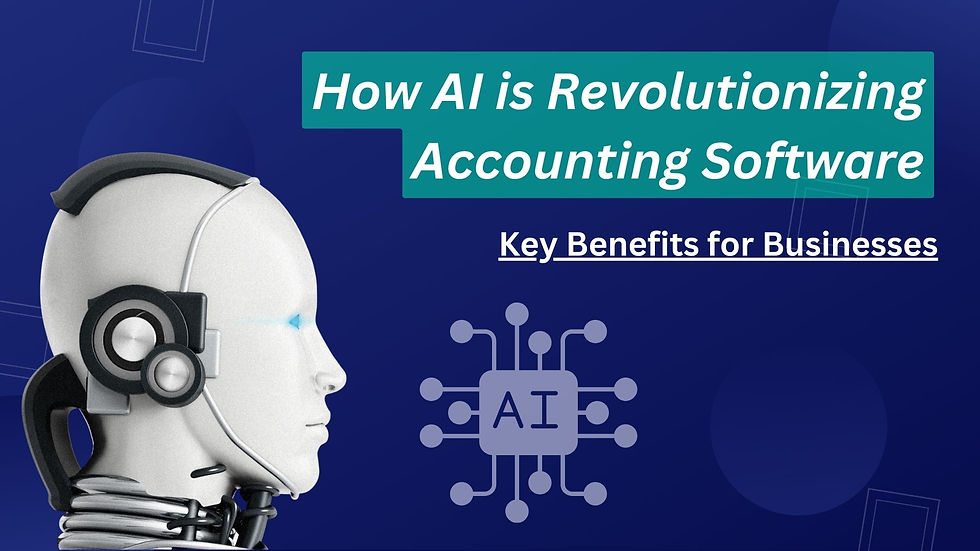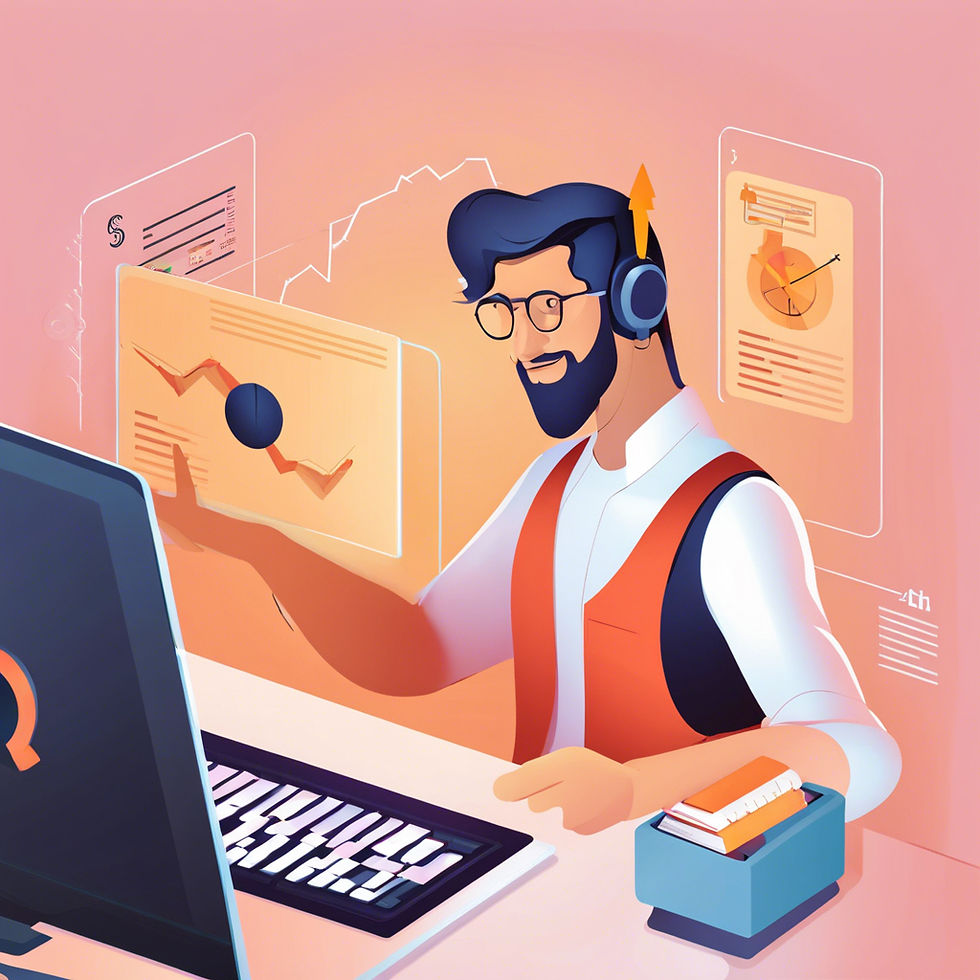How AI is Revolutionizing Accounting Software: Key Benefits for Businesses
- Riya Aggarwal

- Aug 30, 2024
- 4 min read

The accounting industry is undergoing a dramatic transformation, thanks to the rise of Artificial Intelligence (AI). As businesses continue to adopt AI-driven technologies, the landscape of accounting software is evolving at an unprecedented pace. This evolution is not just a trend but a necessity, as companies seek to optimize their financial operations, reduce errors, and enhance decision-making processes. In this comprehensive article, we will explore how AI is revolutionizing accounting software and the key benefits it offers to businesses.
The Emergence of AI in Accounting
AI has been making significant strides in various industries, and accounting is no exception. Traditional accounting software, while efficient, often requires manual input and lacks the ability to analyze large datasets in real-time. AI changes this by automating routine tasks, improving accuracy, and providing deep insights through data analysis.
Automation of Routine Tasks
One of the most significant advantages of AI in accounting software is its ability to automate repetitive tasks. Data entry, invoice processing, and bank reconciliations are examples of routine tasks that can now be handled by AI with minimal human intervention. This not only reduces the time spent on mundane activities but also minimizes the risk of errors.
AI-powered accounting software can automatically categorize transactions, match invoices to payments, and even detect discrepancies in financial data. This level of automation allows accountants to focus on more strategic tasks, such as financial planning and analysis, rather than getting bogged down by administrative duties.
Enhanced Accuracy and Error Reduction
Human error is an inevitable part of manual data entry and processing. However, with AI, the accuracy of accounting data is significantly improved. AI algorithms are designed to detect anomalies and inconsistencies in financial records, ensuring that errors are identified and corrected promptly.
For instance, AI can cross-reference thousands of transactions in a fraction of the time it would take a human, flagging any discrepancies for further review. This level of precision reduces the likelihood of financial misstatements and enhances the reliability of financial reports.
Real-Time Data Analysis and Insights
AI's ability to analyze vast amounts of data in real-time is a game-changer for businesses. Traditional accounting software often relies on historical data, which can limit its usefulness in making forward-looking decisions. AI-driven accounting software, on the other hand, can process current data and provide insights that are both timely and relevant.
This real-time analysis allows businesses to monitor their financial health continuously, identify trends, and make informed decisions quickly. Whether it's forecasting cash flow, assessing profitability, or evaluating the impact of a new business strategy, AI provides the tools necessary for accurate and dynamic financial planning.
Key Benefits of AI in Accounting Software
The integration of AI into accounting software offers a plethora of benefits that go beyond mere automation. Here are some of the most significant advantages that businesses can expect:
Improved Efficiency and Productivity
By automating routine tasks and reducing the need for manual data entry, AI significantly improves the efficiency of accounting processes. This, in turn, boosts productivity, as accountants and financial professionals can allocate their time and resources to more value-added activities.
Moreover, AI can handle tasks at a speed that is impossible for humans, allowing for faster processing of financial data and quicker turnaround times for reports. This improved efficiency is particularly beneficial for businesses with high transaction volumes or complex financial operations.
Cost Savings
Implementing AI in accounting software can lead to substantial cost savings. By reducing the need for manual labor, businesses can lower their operational costs while maintaining, or even improving, the quality of their financial processes. Additionally, AI-driven software can reduce the costs associated with errors, such as penalties for late filings or the need to rework financial statements.
Over time, the return on investment (ROI) from AI-powered accounting software becomes evident, as businesses benefit from lower costs, improved accuracy, and enhanced decision-making capabilities.
Scalability
As businesses grow, their accounting needs become more complex. AI-driven accounting software is highly scalable, making it an ideal solution for companies of all sizes. Whether a business is expanding its operations, entering new markets, or dealing with increasing transaction volumes, AI can easily adapt to these changes without compromising performance.
This scalability ensures that businesses can continue to rely on their accounting software as they grow, without the need for frequent upgrades or the addition of costly new systems.
Enhanced Security

With the increasing threat of cyberattacks and data breaches, security is a top priority for businesses. AI-driven accounting software incorporates advanced security features that protect sensitive financial data from unauthorized access and malicious activities.
AI algorithms can detect unusual patterns in data that may indicate a security breach, allowing businesses to respond quickly and mitigate potential risks. Additionally, AI can ensure compliance with regulatory requirements by monitoring financial activities and generating reports that adhere to industry standards.
Better Decision-Making
AI provides businesses with valuable insights that support better decision-making. By analyzing data in real-time and identifying trends, AI-driven accounting software can help businesses make informed decisions that positively impact their financial performance.
For example, AI can analyze spending patterns and suggest cost-saving opportunities, forecast future financial performance based on historical data, and assess the potential impact of different business strategies. This level of insight empowers businesses to make decisions that are data-driven and aligned with their overall objectives.
The Future of AI in Accounting
The integration of AI into accounting software is just the beginning. As AI technology continues to advance, we can expect even more innovative features and capabilities to emerge. In the future, AI-driven accounting software may include advanced predictive analytics, more sophisticated fraud detection mechanisms, and even greater levels of automation.
Businesses that adopt AI in their accounting processes today will be well-positioned to take advantage of these future developments, ensuring that they remain competitive in an increasingly digital world.
Conclusion
AI is undoubtedly revolutionizing accounting software, offering businesses unprecedented benefits in terms of efficiency, accuracy, and decision-making. By automating routine tasks, reducing errors, and providing real-time insights, AI-driven accounting software is transforming the way businesses manage their finances. As the technology continues to evolve, the impact of AI on the accounting industry will only grow, making it an essential tool for businesses of all sizes.



Comments